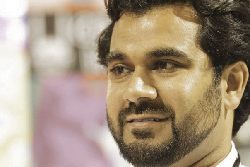Spotlight on New Faculty
Introducing Daniel Friedrich, Assistant Professor of Curriculum, and Arshad Ali, Minority Postdoctoral Fellow in the Department of International and Transcultural Studies
Over the course of each year, Inside profiles the College's annual new cohort of faculty members and post-doctoral fellows. In this issue, we are pleased to introduce Daniel Friedrich, Assistant Professor of Curriculum; and Arshad Ali, Minority Postdoctoral Fellow in the Department of International and Transcultural Studies.
Daniel Friedrich
Assistant Professor of Curriculum, Department of Curriculum and Teaching
What do you teach?
This fall, I'll be teaching C&T 5074: Curriculum and Teaching Policy. During the spring, I'll be leading a seminar on Memory, History and Curriculum and teaching Curriculum Theory and History.
What has been the focus of your research?
So far, I have been focusing my research on the ways in which the citizen is produced through different ideas of responsibility and the role given to history in guiding the present and the future. I have analyzed how in contemporary Argentina, for example, discourses about the last military dictatorship (1976--1983) are mobilized to define and bind the democratic citizen and to exclude those who do not fit.
What are your academic passions?
I am passionate about good challenges--and what is more challenging than defying our own common sense? Facilitating these disruptions, especially when related to our understanding and enacting of equality, brings life to my words.
Who has been influential in the development of your interests and/or career?
As clichd as it may sound, the two most influential people in the development of my interests are my parents-'"my dad, with his constant search for challenges and different ways to make people think; and my mom, with her empathy, compassion and warmth.
Also, recently, Professor Tom Popkewitz served as my advisor and friend at University of Wisconsin-Madison. The day I arrived in Madison, Tom opened the doors of his home to me. He treated me as an equal peer, showing a commitment to the ideas he develops in his work, in everyday life. Tom embodies for me what it means to be a committed intellectual and advisor.
Arshad Ali
Minority Postdoctoral Fellow, Department of International and Transcultural Studies
What do you teach?
I have taught courses focusing on comparative ethnic studies, socio-cultural learning, qualitative research methods, urban education and inequality, student organizing and critical theory/pedagogy in education. Whatever I teach, though, I organize my courses to participate in communities outside of the classroom as a central part of the learning.
What has been the focus of your research?
My current research focuses on the construction of the Muslim subjectivity in the U.S. Among other things, I apply lenses of socio-cultural learning theory, critical race theory and postcolonial thought to look at how Muslim college students here form their sense of personal identity, nationhood and race. The Muslim in this country is a racialized figure whose identity is situated at the crossroads of religious, national and racial difference. More broadly, I believe exploring these tensions between the sacred and the profane, the secular and theological, can provide important insight into notions of democracy, citizenship and political engagement.
What are your academic passions?
I am interested in developing a greater understanding of the relationship of the personal to the political in the lives of young people. Prior to pursuing an academic career, I worked with young people in an afterschool program focusing on political education and community organizing. We engaged young people in thinking hard about schooling in critical ways, and also as an opportunity to develop the tools to truly educate oneself.
Can you recall a memorable teaching experience that influenced your career?
I was 19, working as a mentor in the California Youth Authority. One day a young man asked me to help him with his college application. He was just a bit younger than me and had been incarcerated for five years. Most Americans would assume a young man of color spending his teenage years in a prison facility had no future, but thanks to the program and to adults who took an interest in him, he'd been able to envision a different life path Such experiences are why I became interested in engaging youth who have been silenced, made invisible and ignored by our society.
Published Wednesday, Sep. 1, 2010

